Business Ethics Report: Volkswagen's Ethical Dilemmas and Solutions
VerifiedAdded on 2020/02/17
|13
|4358
|121
Report
AI Summary
This report provides a comprehensive analysis of business ethics, focusing on Volkswagen's ethical challenges and the implications of its actions. It begins by defining business ethics and exploring theoretical approaches like deontology and moral relativism, contrasting relative and absolute ethics. The report then identifies ethical issues affecting businesses, such as employment regulations, equal opportunity, and diversity. It further examines how ethical considerations influence business objectives like profitability, CSR activities, stakeholder expectations, and sales growth. The study also delves into the implications of ethical performance for both the business and its stakeholders, highlighting marketplace advantages, investment opportunities, and employee performance. The report concludes with a discussion of the firm's role as a moral agent, employee involvement mechanisms, and a current ethical issue, suggesting improvements and an ethical code of conduct for Volkswagen. The report references the emission scandal and its impact on the company, emphasizing the importance of ethical conduct in achieving business success and maintaining stakeholder trust.
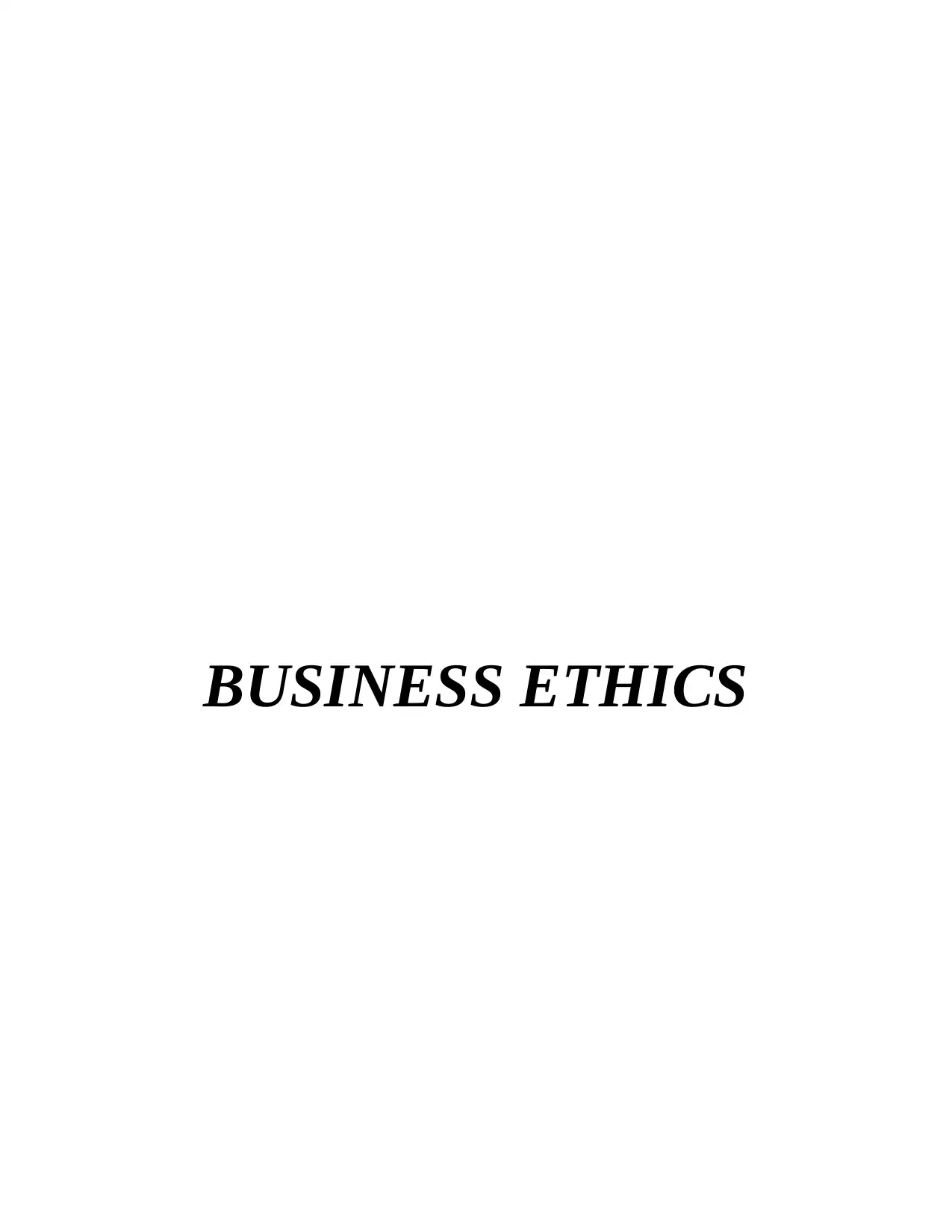
BUSINESS ETHICS
Paraphrase This Document
Need a fresh take? Get an instant paraphrase of this document with our AI Paraphraser
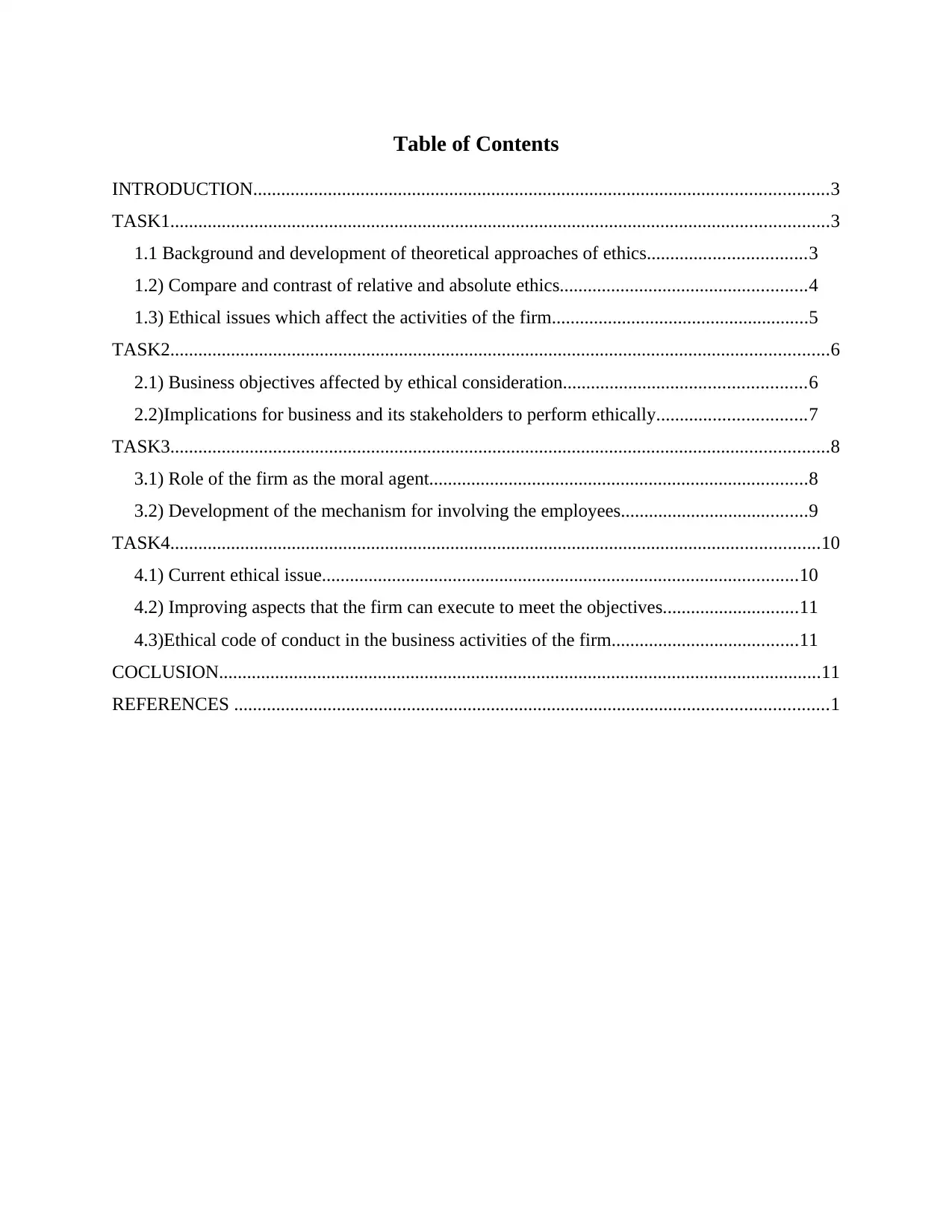
Table of Contents
INTRODUCTION...........................................................................................................................3
TASK1.............................................................................................................................................3
1.1 Background and development of theoretical approaches of ethics..................................3
1.2) Compare and contrast of relative and absolute ethics.....................................................4
1.3) Ethical issues which affect the activities of the firm.......................................................5
TASK2.............................................................................................................................................6
2.1) Business objectives affected by ethical consideration....................................................6
2.2)Implications for business and its stakeholders to perform ethically................................7
TASK3.............................................................................................................................................8
3.1) Role of the firm as the moral agent.................................................................................8
3.2) Development of the mechanism for involving the employees........................................9
TASK4...........................................................................................................................................10
4.1) Current ethical issue......................................................................................................10
4.2) Improving aspects that the firm can execute to meet the objectives.............................11
4.3)Ethical code of conduct in the business activities of the firm........................................11
COCLUSION.................................................................................................................................11
REFERENCES ...............................................................................................................................1
INTRODUCTION...........................................................................................................................3
TASK1.............................................................................................................................................3
1.1 Background and development of theoretical approaches of ethics..................................3
1.2) Compare and contrast of relative and absolute ethics.....................................................4
1.3) Ethical issues which affect the activities of the firm.......................................................5
TASK2.............................................................................................................................................6
2.1) Business objectives affected by ethical consideration....................................................6
2.2)Implications for business and its stakeholders to perform ethically................................7
TASK3.............................................................................................................................................8
3.1) Role of the firm as the moral agent.................................................................................8
3.2) Development of the mechanism for involving the employees........................................9
TASK4...........................................................................................................................................10
4.1) Current ethical issue......................................................................................................10
4.2) Improving aspects that the firm can execute to meet the objectives.............................11
4.3)Ethical code of conduct in the business activities of the firm........................................11
COCLUSION.................................................................................................................................11
REFERENCES ...............................................................................................................................1
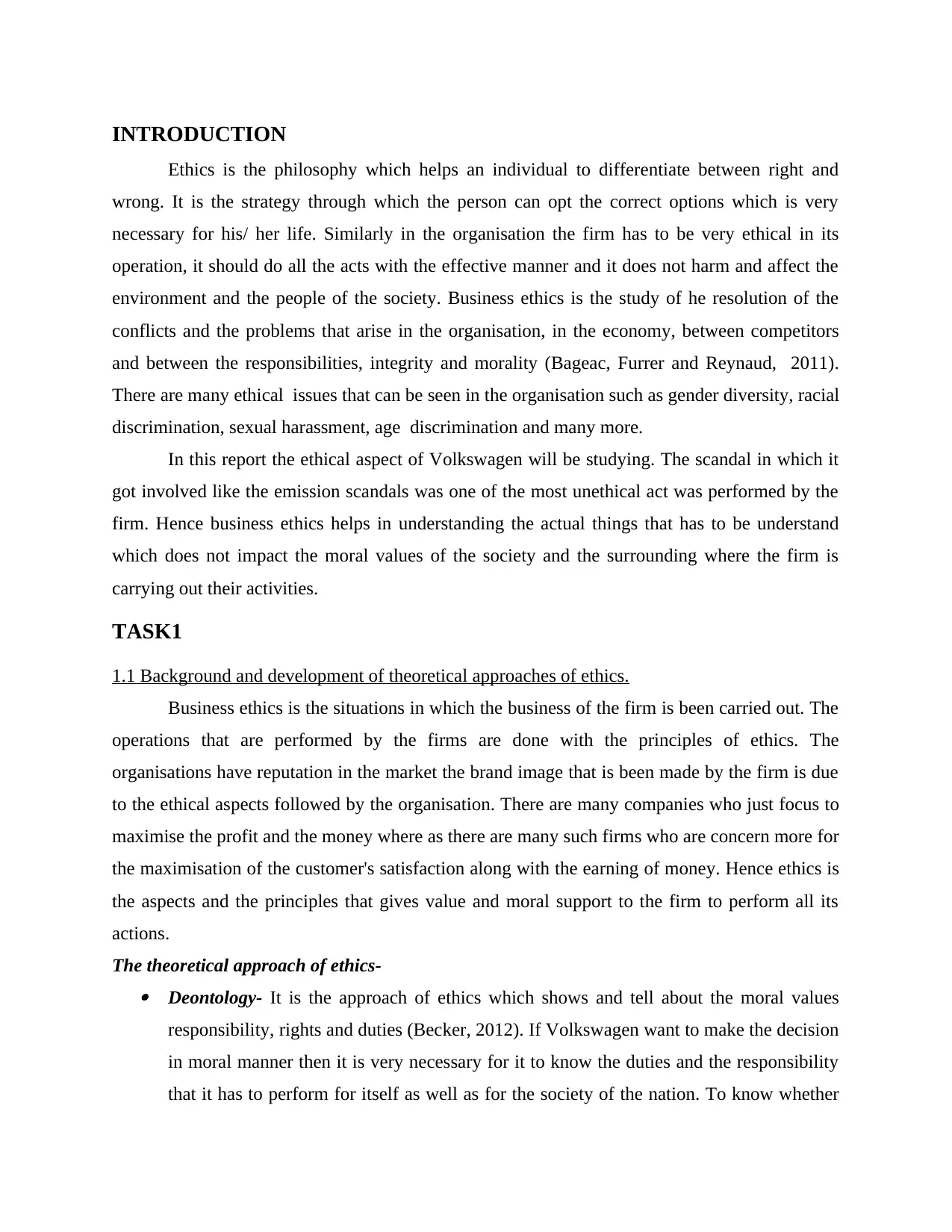
INTRODUCTION
Ethics is the philosophy which helps an individual to differentiate between right and
wrong. It is the strategy through which the person can opt the correct options which is very
necessary for his/ her life. Similarly in the organisation the firm has to be very ethical in its
operation, it should do all the acts with the effective manner and it does not harm and affect the
environment and the people of the society. Business ethics is the study of he resolution of the
conflicts and the problems that arise in the organisation, in the economy, between competitors
and between the responsibilities, integrity and morality (Bageac, Furrer and Reynaud, 2011).
There are many ethical issues that can be seen in the organisation such as gender diversity, racial
discrimination, sexual harassment, age discrimination and many more.
In this report the ethical aspect of Volkswagen will be studying. The scandal in which it
got involved like the emission scandals was one of the most unethical act was performed by the
firm. Hence business ethics helps in understanding the actual things that has to be understand
which does not impact the moral values of the society and the surrounding where the firm is
carrying out their activities.
TASK1
1.1 Background and development of theoretical approaches of ethics.
Business ethics is the situations in which the business of the firm is been carried out. The
operations that are performed by the firms are done with the principles of ethics. The
organisations have reputation in the market the brand image that is been made by the firm is due
to the ethical aspects followed by the organisation. There are many companies who just focus to
maximise the profit and the money where as there are many such firms who are concern more for
the maximisation of the customer's satisfaction along with the earning of money. Hence ethics is
the aspects and the principles that gives value and moral support to the firm to perform all its
actions.
The theoretical approach of ethics- Deontology- It is the approach of ethics which shows and tell about the moral values
responsibility, rights and duties (Becker, 2012). If Volkswagen want to make the decision
in moral manner then it is very necessary for it to know the duties and the responsibility
that it has to perform for itself as well as for the society of the nation. To know whether
Ethics is the philosophy which helps an individual to differentiate between right and
wrong. It is the strategy through which the person can opt the correct options which is very
necessary for his/ her life. Similarly in the organisation the firm has to be very ethical in its
operation, it should do all the acts with the effective manner and it does not harm and affect the
environment and the people of the society. Business ethics is the study of he resolution of the
conflicts and the problems that arise in the organisation, in the economy, between competitors
and between the responsibilities, integrity and morality (Bageac, Furrer and Reynaud, 2011).
There are many ethical issues that can be seen in the organisation such as gender diversity, racial
discrimination, sexual harassment, age discrimination and many more.
In this report the ethical aspect of Volkswagen will be studying. The scandal in which it
got involved like the emission scandals was one of the most unethical act was performed by the
firm. Hence business ethics helps in understanding the actual things that has to be understand
which does not impact the moral values of the society and the surrounding where the firm is
carrying out their activities.
TASK1
1.1 Background and development of theoretical approaches of ethics.
Business ethics is the situations in which the business of the firm is been carried out. The
operations that are performed by the firms are done with the principles of ethics. The
organisations have reputation in the market the brand image that is been made by the firm is due
to the ethical aspects followed by the organisation. There are many companies who just focus to
maximise the profit and the money where as there are many such firms who are concern more for
the maximisation of the customer's satisfaction along with the earning of money. Hence ethics is
the aspects and the principles that gives value and moral support to the firm to perform all its
actions.
The theoretical approach of ethics- Deontology- It is the approach of ethics which shows and tell about the moral values
responsibility, rights and duties (Becker, 2012). If Volkswagen want to make the decision
in moral manner then it is very necessary for it to know the duties and the responsibility
that it has to perform for itself as well as for the society of the nation. To know whether
⊘ This is a preview!⊘
Do you want full access?
Subscribe today to unlock all pages.

Trusted by 1+ million students worldwide
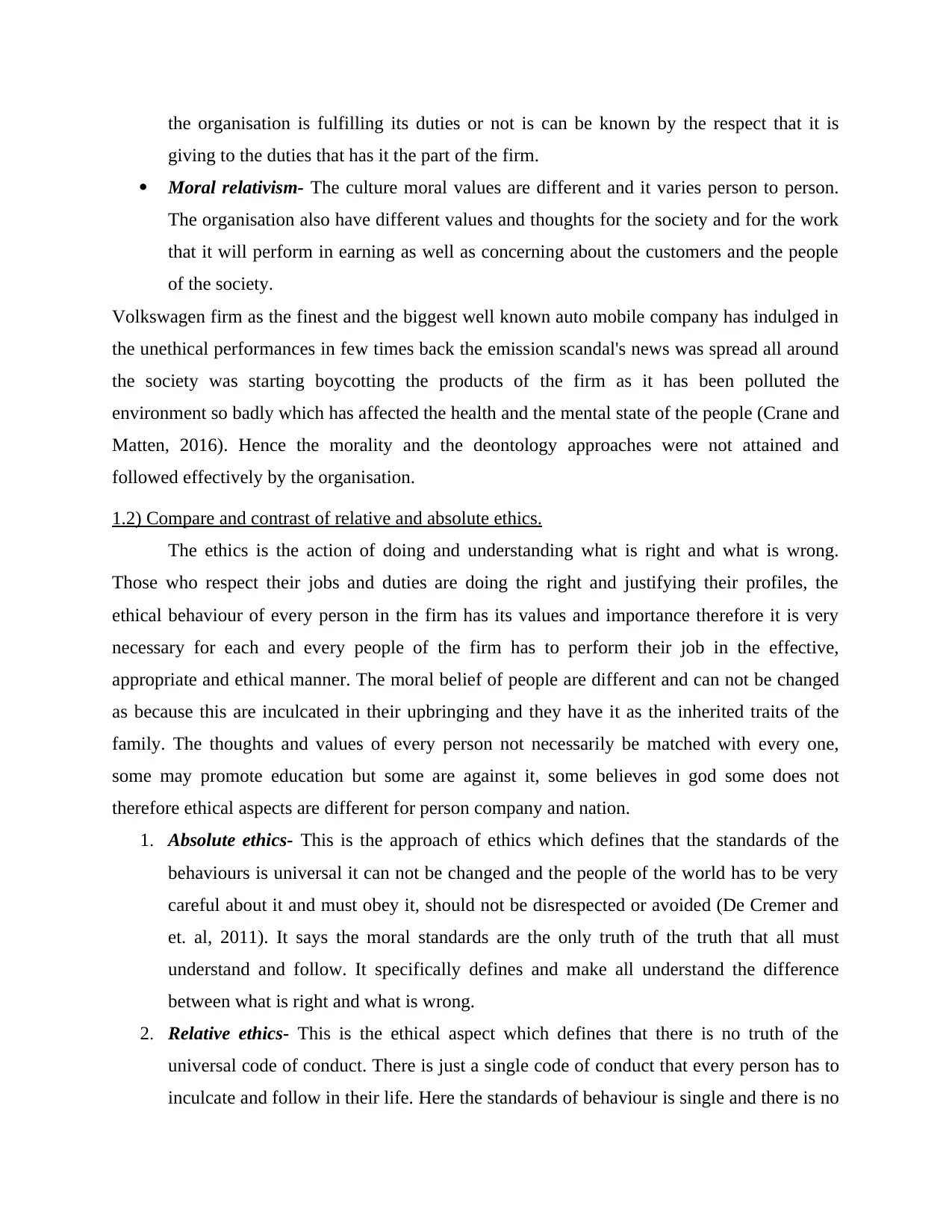
the organisation is fulfilling its duties or not is can be known by the respect that it is
giving to the duties that has it the part of the firm.
Moral relativism- The culture moral values are different and it varies person to person.
The organisation also have different values and thoughts for the society and for the work
that it will perform in earning as well as concerning about the customers and the people
of the society.
Volkswagen firm as the finest and the biggest well known auto mobile company has indulged in
the unethical performances in few times back the emission scandal's news was spread all around
the society was starting boycotting the products of the firm as it has been polluted the
environment so badly which has affected the health and the mental state of the people (Crane and
Matten, 2016). Hence the morality and the deontology approaches were not attained and
followed effectively by the organisation.
1.2) Compare and contrast of relative and absolute ethics.
The ethics is the action of doing and understanding what is right and what is wrong.
Those who respect their jobs and duties are doing the right and justifying their profiles, the
ethical behaviour of every person in the firm has its values and importance therefore it is very
necessary for each and every people of the firm has to perform their job in the effective,
appropriate and ethical manner. The moral belief of people are different and can not be changed
as because this are inculcated in their upbringing and they have it as the inherited traits of the
family. The thoughts and values of every person not necessarily be matched with every one,
some may promote education but some are against it, some believes in god some does not
therefore ethical aspects are different for person company and nation.
1. Absolute ethics- This is the approach of ethics which defines that the standards of the
behaviours is universal it can not be changed and the people of the world has to be very
careful about it and must obey it, should not be disrespected or avoided (De Cremer and
et. al, 2011). It says the moral standards are the only truth of the truth that all must
understand and follow. It specifically defines and make all understand the difference
between what is right and what is wrong.
2. Relative ethics- This is the ethical aspect which defines that there is no truth of the
universal code of conduct. There is just a single code of conduct that every person has to
inculcate and follow in their life. Here the standards of behaviour is single and there is no
giving to the duties that has it the part of the firm.
Moral relativism- The culture moral values are different and it varies person to person.
The organisation also have different values and thoughts for the society and for the work
that it will perform in earning as well as concerning about the customers and the people
of the society.
Volkswagen firm as the finest and the biggest well known auto mobile company has indulged in
the unethical performances in few times back the emission scandal's news was spread all around
the society was starting boycotting the products of the firm as it has been polluted the
environment so badly which has affected the health and the mental state of the people (Crane and
Matten, 2016). Hence the morality and the deontology approaches were not attained and
followed effectively by the organisation.
1.2) Compare and contrast of relative and absolute ethics.
The ethics is the action of doing and understanding what is right and what is wrong.
Those who respect their jobs and duties are doing the right and justifying their profiles, the
ethical behaviour of every person in the firm has its values and importance therefore it is very
necessary for each and every people of the firm has to perform their job in the effective,
appropriate and ethical manner. The moral belief of people are different and can not be changed
as because this are inculcated in their upbringing and they have it as the inherited traits of the
family. The thoughts and values of every person not necessarily be matched with every one,
some may promote education but some are against it, some believes in god some does not
therefore ethical aspects are different for person company and nation.
1. Absolute ethics- This is the approach of ethics which defines that the standards of the
behaviours is universal it can not be changed and the people of the world has to be very
careful about it and must obey it, should not be disrespected or avoided (De Cremer and
et. al, 2011). It says the moral standards are the only truth of the truth that all must
understand and follow. It specifically defines and make all understand the difference
between what is right and what is wrong.
2. Relative ethics- This is the ethical aspect which defines that there is no truth of the
universal code of conduct. There is just a single code of conduct that every person has to
inculcate and follow in their life. Here the standards of behaviour is single and there is no
Paraphrase This Document
Need a fresh take? Get an instant paraphrase of this document with our AI Paraphraser
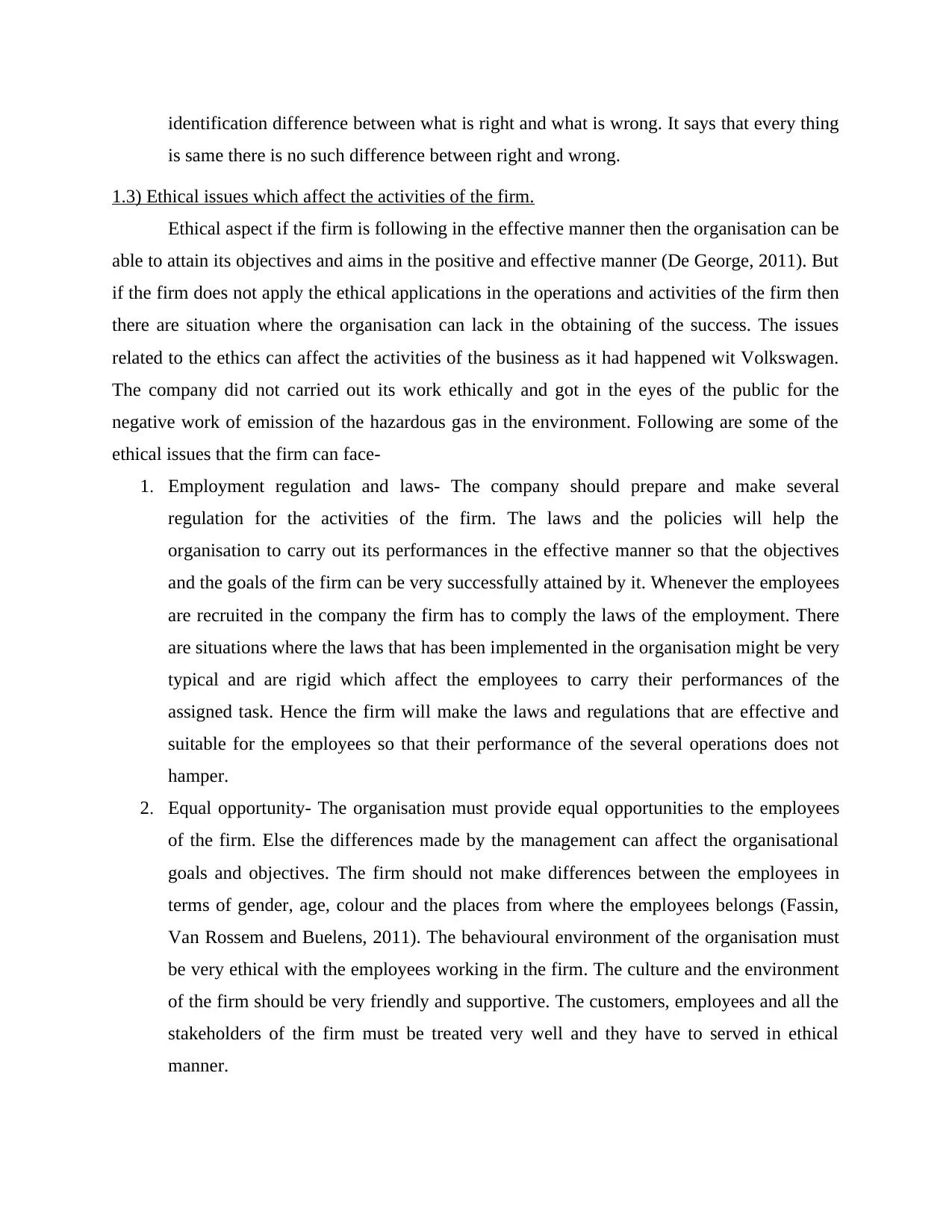
identification difference between what is right and what is wrong. It says that every thing
is same there is no such difference between right and wrong.
1.3) Ethical issues which affect the activities of the firm.
Ethical aspect if the firm is following in the effective manner then the organisation can be
able to attain its objectives and aims in the positive and effective manner (De George, 2011). But
if the firm does not apply the ethical applications in the operations and activities of the firm then
there are situation where the organisation can lack in the obtaining of the success. The issues
related to the ethics can affect the activities of the business as it had happened wit Volkswagen.
The company did not carried out its work ethically and got in the eyes of the public for the
negative work of emission of the hazardous gas in the environment. Following are some of the
ethical issues that the firm can face-
1. Employment regulation and laws- The company should prepare and make several
regulation for the activities of the firm. The laws and the policies will help the
organisation to carry out its performances in the effective manner so that the objectives
and the goals of the firm can be very successfully attained by it. Whenever the employees
are recruited in the company the firm has to comply the laws of the employment. There
are situations where the laws that has been implemented in the organisation might be very
typical and are rigid which affect the employees to carry their performances of the
assigned task. Hence the firm will make the laws and regulations that are effective and
suitable for the employees so that their performance of the several operations does not
hamper.
2. Equal opportunity- The organisation must provide equal opportunities to the employees
of the firm. Else the differences made by the management can affect the organisational
goals and objectives. The firm should not make differences between the employees in
terms of gender, age, colour and the places from where the employees belongs (Fassin,
Van Rossem and Buelens, 2011). The behavioural environment of the organisation must
be very ethical with the employees working in the firm. The culture and the environment
of the firm should be very friendly and supportive. The customers, employees and all the
stakeholders of the firm must be treated very well and they have to served in ethical
manner.
is same there is no such difference between right and wrong.
1.3) Ethical issues which affect the activities of the firm.
Ethical aspect if the firm is following in the effective manner then the organisation can be
able to attain its objectives and aims in the positive and effective manner (De George, 2011). But
if the firm does not apply the ethical applications in the operations and activities of the firm then
there are situation where the organisation can lack in the obtaining of the success. The issues
related to the ethics can affect the activities of the business as it had happened wit Volkswagen.
The company did not carried out its work ethically and got in the eyes of the public for the
negative work of emission of the hazardous gas in the environment. Following are some of the
ethical issues that the firm can face-
1. Employment regulation and laws- The company should prepare and make several
regulation for the activities of the firm. The laws and the policies will help the
organisation to carry out its performances in the effective manner so that the objectives
and the goals of the firm can be very successfully attained by it. Whenever the employees
are recruited in the company the firm has to comply the laws of the employment. There
are situations where the laws that has been implemented in the organisation might be very
typical and are rigid which affect the employees to carry their performances of the
assigned task. Hence the firm will make the laws and regulations that are effective and
suitable for the employees so that their performance of the several operations does not
hamper.
2. Equal opportunity- The organisation must provide equal opportunities to the employees
of the firm. Else the differences made by the management can affect the organisational
goals and objectives. The firm should not make differences between the employees in
terms of gender, age, colour and the places from where the employees belongs (Fassin,
Van Rossem and Buelens, 2011). The behavioural environment of the organisation must
be very ethical with the employees working in the firm. The culture and the environment
of the firm should be very friendly and supportive. The customers, employees and all the
stakeholders of the firm must be treated very well and they have to served in ethical
manner.
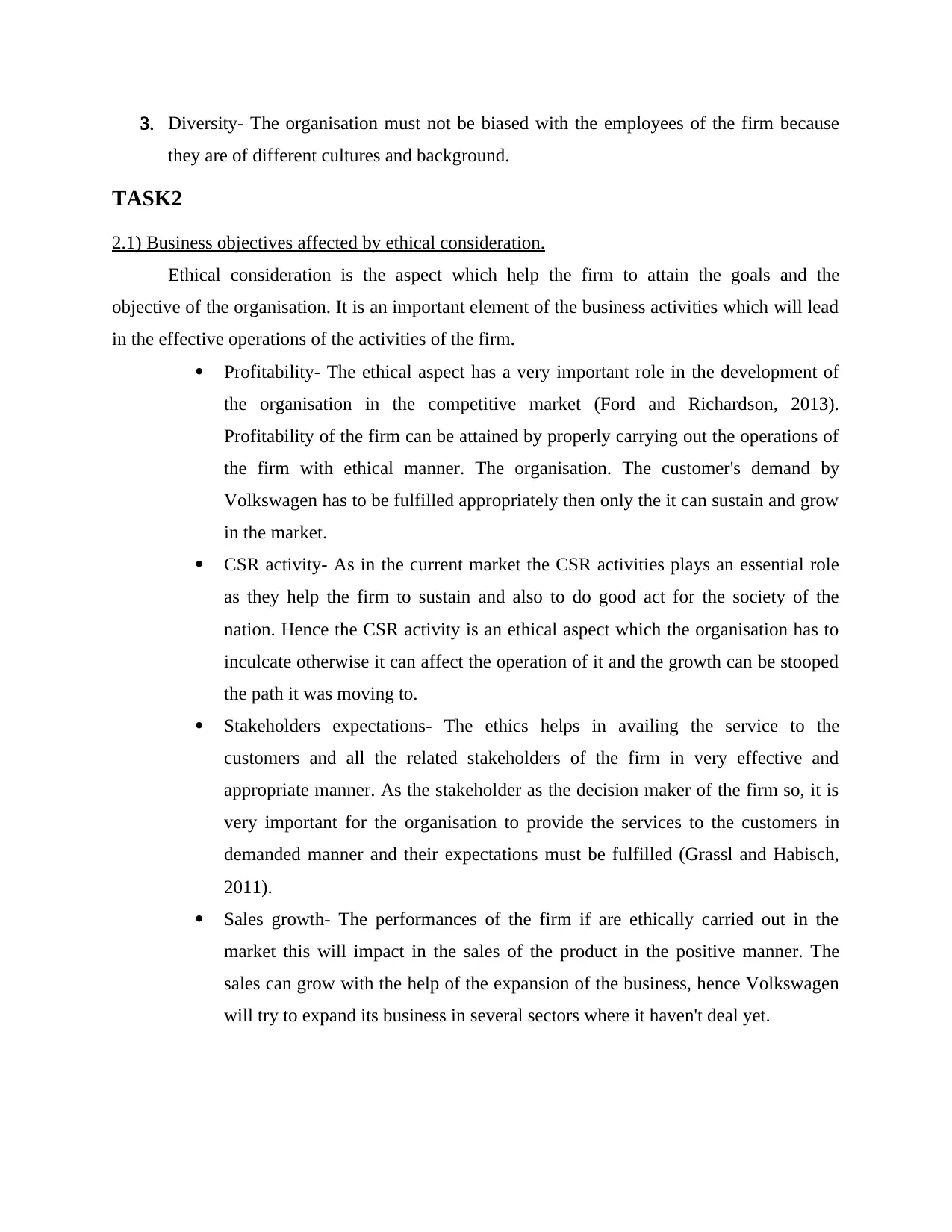
3. Diversity- The organisation must not be biased with the employees of the firm because
they are of different cultures and background.
TASK2
2.1) Business objectives affected by ethical consideration.
Ethical consideration is the aspect which help the firm to attain the goals and the
objective of the organisation. It is an important element of the business activities which will lead
in the effective operations of the activities of the firm.
Profitability- The ethical aspect has a very important role in the development of
the organisation in the competitive market (Ford and Richardson, 2013).
Profitability of the firm can be attained by properly carrying out the operations of
the firm with ethical manner. The organisation. The customer's demand by
Volkswagen has to be fulfilled appropriately then only the it can sustain and grow
in the market.
CSR activity- As in the current market the CSR activities plays an essential role
as they help the firm to sustain and also to do good act for the society of the
nation. Hence the CSR activity is an ethical aspect which the organisation has to
inculcate otherwise it can affect the operation of it and the growth can be stooped
the path it was moving to.
Stakeholders expectations- The ethics helps in availing the service to the
customers and all the related stakeholders of the firm in very effective and
appropriate manner. As the stakeholder as the decision maker of the firm so, it is
very important for the organisation to provide the services to the customers in
demanded manner and their expectations must be fulfilled (Grassl and Habisch,
2011).
Sales growth- The performances of the firm if are ethically carried out in the
market this will impact in the sales of the product in the positive manner. The
sales can grow with the help of the expansion of the business, hence Volkswagen
will try to expand its business in several sectors where it haven't deal yet.
they are of different cultures and background.
TASK2
2.1) Business objectives affected by ethical consideration.
Ethical consideration is the aspect which help the firm to attain the goals and the
objective of the organisation. It is an important element of the business activities which will lead
in the effective operations of the activities of the firm.
Profitability- The ethical aspect has a very important role in the development of
the organisation in the competitive market (Ford and Richardson, 2013).
Profitability of the firm can be attained by properly carrying out the operations of
the firm with ethical manner. The organisation. The customer's demand by
Volkswagen has to be fulfilled appropriately then only the it can sustain and grow
in the market.
CSR activity- As in the current market the CSR activities plays an essential role
as they help the firm to sustain and also to do good act for the society of the
nation. Hence the CSR activity is an ethical aspect which the organisation has to
inculcate otherwise it can affect the operation of it and the growth can be stooped
the path it was moving to.
Stakeholders expectations- The ethics helps in availing the service to the
customers and all the related stakeholders of the firm in very effective and
appropriate manner. As the stakeholder as the decision maker of the firm so, it is
very important for the organisation to provide the services to the customers in
demanded manner and their expectations must be fulfilled (Grassl and Habisch,
2011).
Sales growth- The performances of the firm if are ethically carried out in the
market this will impact in the sales of the product in the positive manner. The
sales can grow with the help of the expansion of the business, hence Volkswagen
will try to expand its business in several sectors where it haven't deal yet.
⊘ This is a preview!⊘
Do you want full access?
Subscribe today to unlock all pages.

Trusted by 1+ million students worldwide
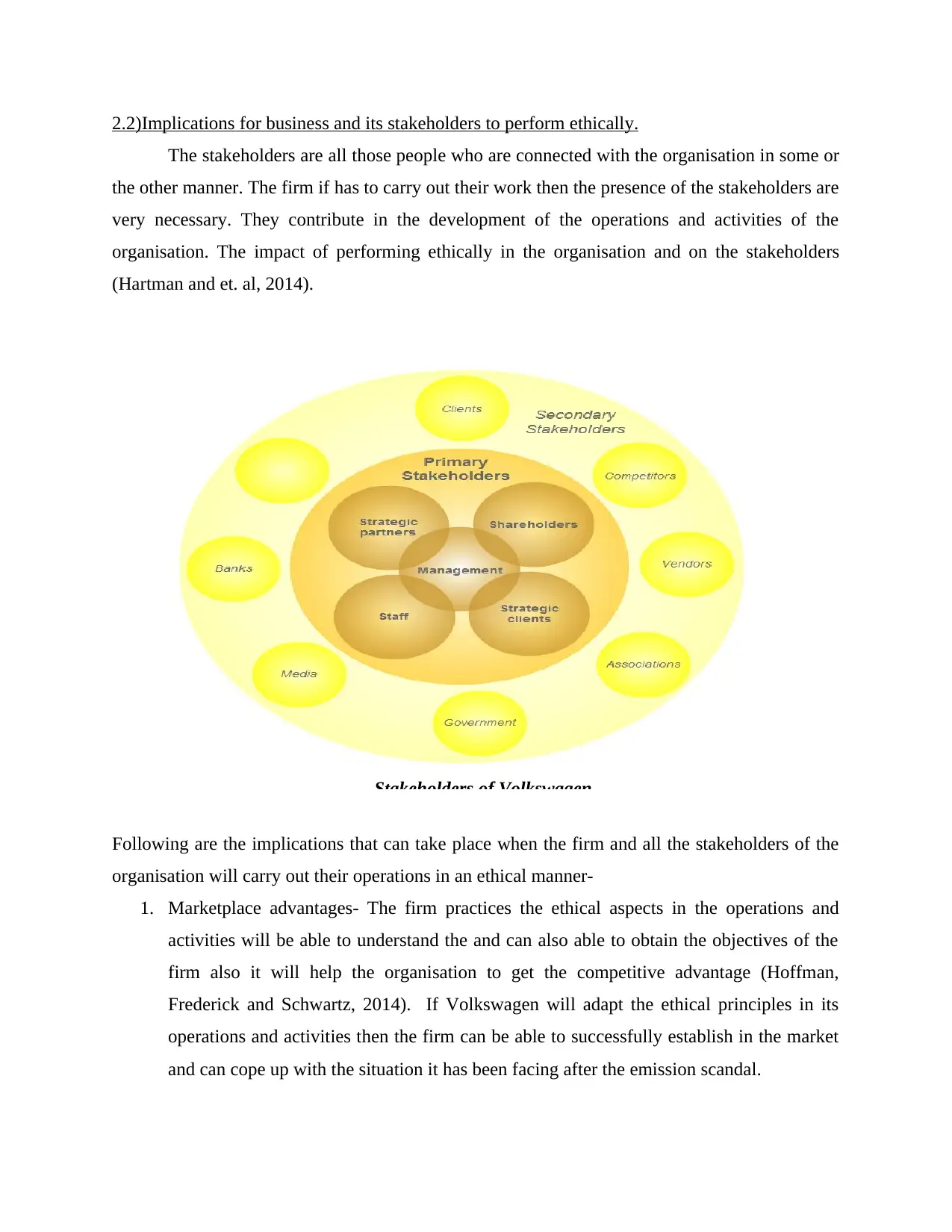
2.2)Implications for business and its stakeholders to perform ethically.
The stakeholders are all those people who are connected with the organisation in some or
the other manner. The firm if has to carry out their work then the presence of the stakeholders are
very necessary. They contribute in the development of the operations and activities of the
organisation. The impact of performing ethically in the organisation and on the stakeholders
(Hartman and et. al, 2014).
Following are the implications that can take place when the firm and all the stakeholders of the
organisation will carry out their operations in an ethical manner-
1. Marketplace advantages- The firm practices the ethical aspects in the operations and
activities will be able to understand the and can also able to obtain the objectives of the
firm also it will help the organisation to get the competitive advantage (Hoffman,
Frederick and Schwartz, 2014). If Volkswagen will adapt the ethical principles in its
operations and activities then the firm can be able to successfully establish in the market
and can cope up with the situation it has been facing after the emission scandal.
Stakeholders of Volkswagen
The stakeholders are all those people who are connected with the organisation in some or
the other manner. The firm if has to carry out their work then the presence of the stakeholders are
very necessary. They contribute in the development of the operations and activities of the
organisation. The impact of performing ethically in the organisation and on the stakeholders
(Hartman and et. al, 2014).
Following are the implications that can take place when the firm and all the stakeholders of the
organisation will carry out their operations in an ethical manner-
1. Marketplace advantages- The firm practices the ethical aspects in the operations and
activities will be able to understand the and can also able to obtain the objectives of the
firm also it will help the organisation to get the competitive advantage (Hoffman,
Frederick and Schwartz, 2014). If Volkswagen will adapt the ethical principles in its
operations and activities then the firm can be able to successfully establish in the market
and can cope up with the situation it has been facing after the emission scandal.
Stakeholders of Volkswagen
Paraphrase This Document
Need a fresh take? Get an instant paraphrase of this document with our AI Paraphraser
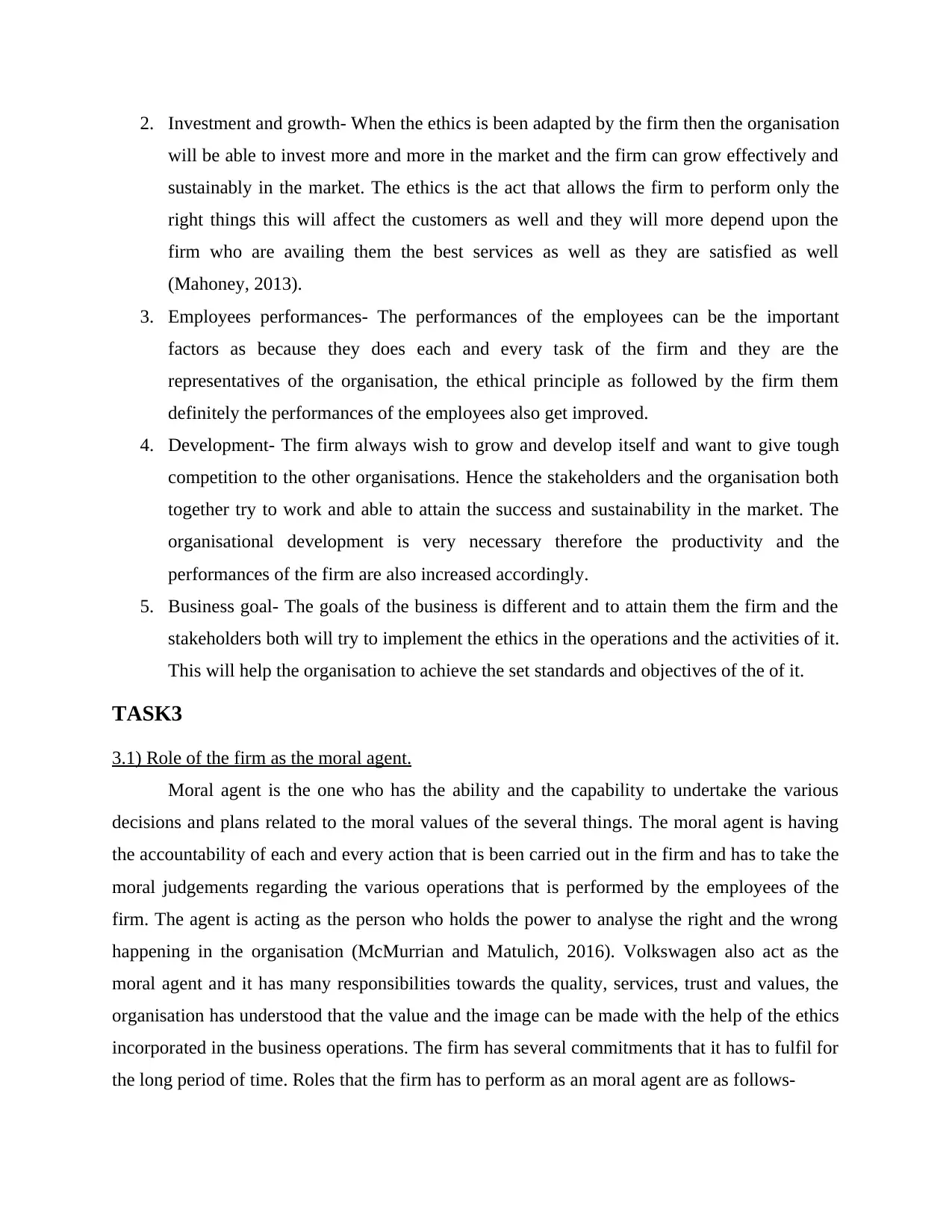
2. Investment and growth- When the ethics is been adapted by the firm then the organisation
will be able to invest more and more in the market and the firm can grow effectively and
sustainably in the market. The ethics is the act that allows the firm to perform only the
right things this will affect the customers as well and they will more depend upon the
firm who are availing them the best services as well as they are satisfied as well
(Mahoney, 2013).
3. Employees performances- The performances of the employees can be the important
factors as because they does each and every task of the firm and they are the
representatives of the organisation, the ethical principle as followed by the firm them
definitely the performances of the employees also get improved.
4. Development- The firm always wish to grow and develop itself and want to give tough
competition to the other organisations. Hence the stakeholders and the organisation both
together try to work and able to attain the success and sustainability in the market. The
organisational development is very necessary therefore the productivity and the
performances of the firm are also increased accordingly.
5. Business goal- The goals of the business is different and to attain them the firm and the
stakeholders both will try to implement the ethics in the operations and the activities of it.
This will help the organisation to achieve the set standards and objectives of the of it.
TASK3
3.1) Role of the firm as the moral agent.
Moral agent is the one who has the ability and the capability to undertake the various
decisions and plans related to the moral values of the several things. The moral agent is having
the accountability of each and every action that is been carried out in the firm and has to take the
moral judgements regarding the various operations that is performed by the employees of the
firm. The agent is acting as the person who holds the power to analyse the right and the wrong
happening in the organisation (McMurrian and Matulich, 2016). Volkswagen also act as the
moral agent and it has many responsibilities towards the quality, services, trust and values, the
organisation has understood that the value and the image can be made with the help of the ethics
incorporated in the business operations. The firm has several commitments that it has to fulfil for
the long period of time. Roles that the firm has to perform as an moral agent are as follows-
will be able to invest more and more in the market and the firm can grow effectively and
sustainably in the market. The ethics is the act that allows the firm to perform only the
right things this will affect the customers as well and they will more depend upon the
firm who are availing them the best services as well as they are satisfied as well
(Mahoney, 2013).
3. Employees performances- The performances of the employees can be the important
factors as because they does each and every task of the firm and they are the
representatives of the organisation, the ethical principle as followed by the firm them
definitely the performances of the employees also get improved.
4. Development- The firm always wish to grow and develop itself and want to give tough
competition to the other organisations. Hence the stakeholders and the organisation both
together try to work and able to attain the success and sustainability in the market. The
organisational development is very necessary therefore the productivity and the
performances of the firm are also increased accordingly.
5. Business goal- The goals of the business is different and to attain them the firm and the
stakeholders both will try to implement the ethics in the operations and the activities of it.
This will help the organisation to achieve the set standards and objectives of the of it.
TASK3
3.1) Role of the firm as the moral agent.
Moral agent is the one who has the ability and the capability to undertake the various
decisions and plans related to the moral values of the several things. The moral agent is having
the accountability of each and every action that is been carried out in the firm and has to take the
moral judgements regarding the various operations that is performed by the employees of the
firm. The agent is acting as the person who holds the power to analyse the right and the wrong
happening in the organisation (McMurrian and Matulich, 2016). Volkswagen also act as the
moral agent and it has many responsibilities towards the quality, services, trust and values, the
organisation has understood that the value and the image can be made with the help of the ethics
incorporated in the business operations. The firm has several commitments that it has to fulfil for
the long period of time. Roles that the firm has to perform as an moral agent are as follows-
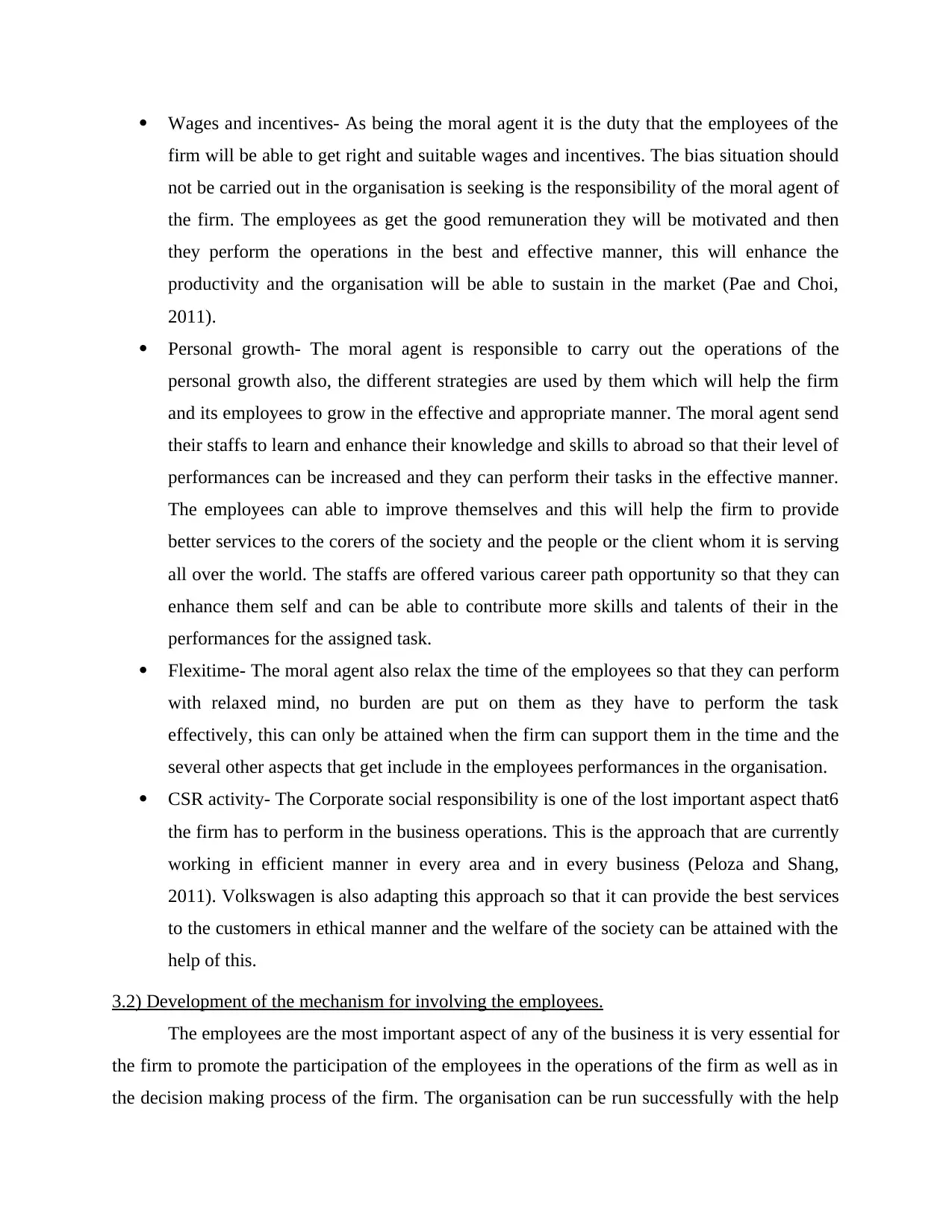
Wages and incentives- As being the moral agent it is the duty that the employees of the
firm will be able to get right and suitable wages and incentives. The bias situation should
not be carried out in the organisation is seeking is the responsibility of the moral agent of
the firm. The employees as get the good remuneration they will be motivated and then
they perform the operations in the best and effective manner, this will enhance the
productivity and the organisation will be able to sustain in the market (Pae and Choi,
2011).
Personal growth- The moral agent is responsible to carry out the operations of the
personal growth also, the different strategies are used by them which will help the firm
and its employees to grow in the effective and appropriate manner. The moral agent send
their staffs to learn and enhance their knowledge and skills to abroad so that their level of
performances can be increased and they can perform their tasks in the effective manner.
The employees can able to improve themselves and this will help the firm to provide
better services to the corers of the society and the people or the client whom it is serving
all over the world. The staffs are offered various career path opportunity so that they can
enhance them self and can be able to contribute more skills and talents of their in the
performances for the assigned task.
Flexitime- The moral agent also relax the time of the employees so that they can perform
with relaxed mind, no burden are put on them as they have to perform the task
effectively, this can only be attained when the firm can support them in the time and the
several other aspects that get include in the employees performances in the organisation.
CSR activity- The Corporate social responsibility is one of the lost important aspect that6
the firm has to perform in the business operations. This is the approach that are currently
working in efficient manner in every area and in every business (Peloza and Shang,
2011). Volkswagen is also adapting this approach so that it can provide the best services
to the customers in ethical manner and the welfare of the society can be attained with the
help of this.
3.2) Development of the mechanism for involving the employees.
The employees are the most important aspect of any of the business it is very essential for
the firm to promote the participation of the employees in the operations of the firm as well as in
the decision making process of the firm. The organisation can be run successfully with the help
firm will be able to get right and suitable wages and incentives. The bias situation should
not be carried out in the organisation is seeking is the responsibility of the moral agent of
the firm. The employees as get the good remuneration they will be motivated and then
they perform the operations in the best and effective manner, this will enhance the
productivity and the organisation will be able to sustain in the market (Pae and Choi,
2011).
Personal growth- The moral agent is responsible to carry out the operations of the
personal growth also, the different strategies are used by them which will help the firm
and its employees to grow in the effective and appropriate manner. The moral agent send
their staffs to learn and enhance their knowledge and skills to abroad so that their level of
performances can be increased and they can perform their tasks in the effective manner.
The employees can able to improve themselves and this will help the firm to provide
better services to the corers of the society and the people or the client whom it is serving
all over the world. The staffs are offered various career path opportunity so that they can
enhance them self and can be able to contribute more skills and talents of their in the
performances for the assigned task.
Flexitime- The moral agent also relax the time of the employees so that they can perform
with relaxed mind, no burden are put on them as they have to perform the task
effectively, this can only be attained when the firm can support them in the time and the
several other aspects that get include in the employees performances in the organisation.
CSR activity- The Corporate social responsibility is one of the lost important aspect that6
the firm has to perform in the business operations. This is the approach that are currently
working in efficient manner in every area and in every business (Peloza and Shang,
2011). Volkswagen is also adapting this approach so that it can provide the best services
to the customers in ethical manner and the welfare of the society can be attained with the
help of this.
3.2) Development of the mechanism for involving the employees.
The employees are the most important aspect of any of the business it is very essential for
the firm to promote the participation of the employees in the operations of the firm as well as in
the decision making process of the firm. The organisation can be run successfully with the help
⊘ This is a preview!⊘
Do you want full access?
Subscribe today to unlock all pages.

Trusted by 1+ million students worldwide
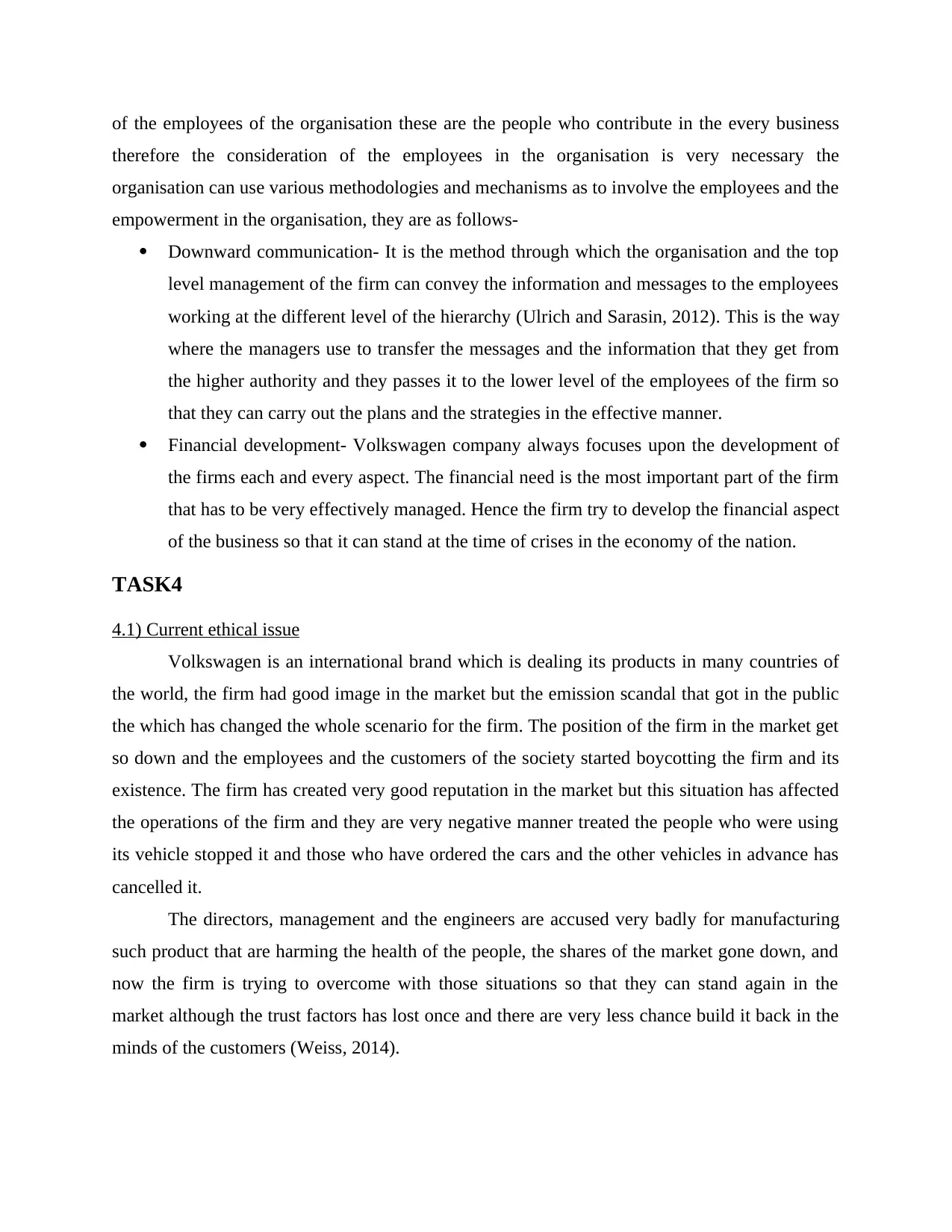
of the employees of the organisation these are the people who contribute in the every business
therefore the consideration of the employees in the organisation is very necessary the
organisation can use various methodologies and mechanisms as to involve the employees and the
empowerment in the organisation, they are as follows-
Downward communication- It is the method through which the organisation and the top
level management of the firm can convey the information and messages to the employees
working at the different level of the hierarchy (Ulrich and Sarasin, 2012). This is the way
where the managers use to transfer the messages and the information that they get from
the higher authority and they passes it to the lower level of the employees of the firm so
that they can carry out the plans and the strategies in the effective manner.
Financial development- Volkswagen company always focuses upon the development of
the firms each and every aspect. The financial need is the most important part of the firm
that has to be very effectively managed. Hence the firm try to develop the financial aspect
of the business so that it can stand at the time of crises in the economy of the nation.
TASK4
4.1) Current ethical issue
Volkswagen is an international brand which is dealing its products in many countries of
the world, the firm had good image in the market but the emission scandal that got in the public
the which has changed the whole scenario for the firm. The position of the firm in the market get
so down and the employees and the customers of the society started boycotting the firm and its
existence. The firm has created very good reputation in the market but this situation has affected
the operations of the firm and they are very negative manner treated the people who were using
its vehicle stopped it and those who have ordered the cars and the other vehicles in advance has
cancelled it.
The directors, management and the engineers are accused very badly for manufacturing
such product that are harming the health of the people, the shares of the market gone down, and
now the firm is trying to overcome with those situations so that they can stand again in the
market although the trust factors has lost once and there are very less chance build it back in the
minds of the customers (Weiss, 2014).
therefore the consideration of the employees in the organisation is very necessary the
organisation can use various methodologies and mechanisms as to involve the employees and the
empowerment in the organisation, they are as follows-
Downward communication- It is the method through which the organisation and the top
level management of the firm can convey the information and messages to the employees
working at the different level of the hierarchy (Ulrich and Sarasin, 2012). This is the way
where the managers use to transfer the messages and the information that they get from
the higher authority and they passes it to the lower level of the employees of the firm so
that they can carry out the plans and the strategies in the effective manner.
Financial development- Volkswagen company always focuses upon the development of
the firms each and every aspect. The financial need is the most important part of the firm
that has to be very effectively managed. Hence the firm try to develop the financial aspect
of the business so that it can stand at the time of crises in the economy of the nation.
TASK4
4.1) Current ethical issue
Volkswagen is an international brand which is dealing its products in many countries of
the world, the firm had good image in the market but the emission scandal that got in the public
the which has changed the whole scenario for the firm. The position of the firm in the market get
so down and the employees and the customers of the society started boycotting the firm and its
existence. The firm has created very good reputation in the market but this situation has affected
the operations of the firm and they are very negative manner treated the people who were using
its vehicle stopped it and those who have ordered the cars and the other vehicles in advance has
cancelled it.
The directors, management and the engineers are accused very badly for manufacturing
such product that are harming the health of the people, the shares of the market gone down, and
now the firm is trying to overcome with those situations so that they can stand again in the
market although the trust factors has lost once and there are very less chance build it back in the
minds of the customers (Weiss, 2014).
Paraphrase This Document
Need a fresh take? Get an instant paraphrase of this document with our AI Paraphraser
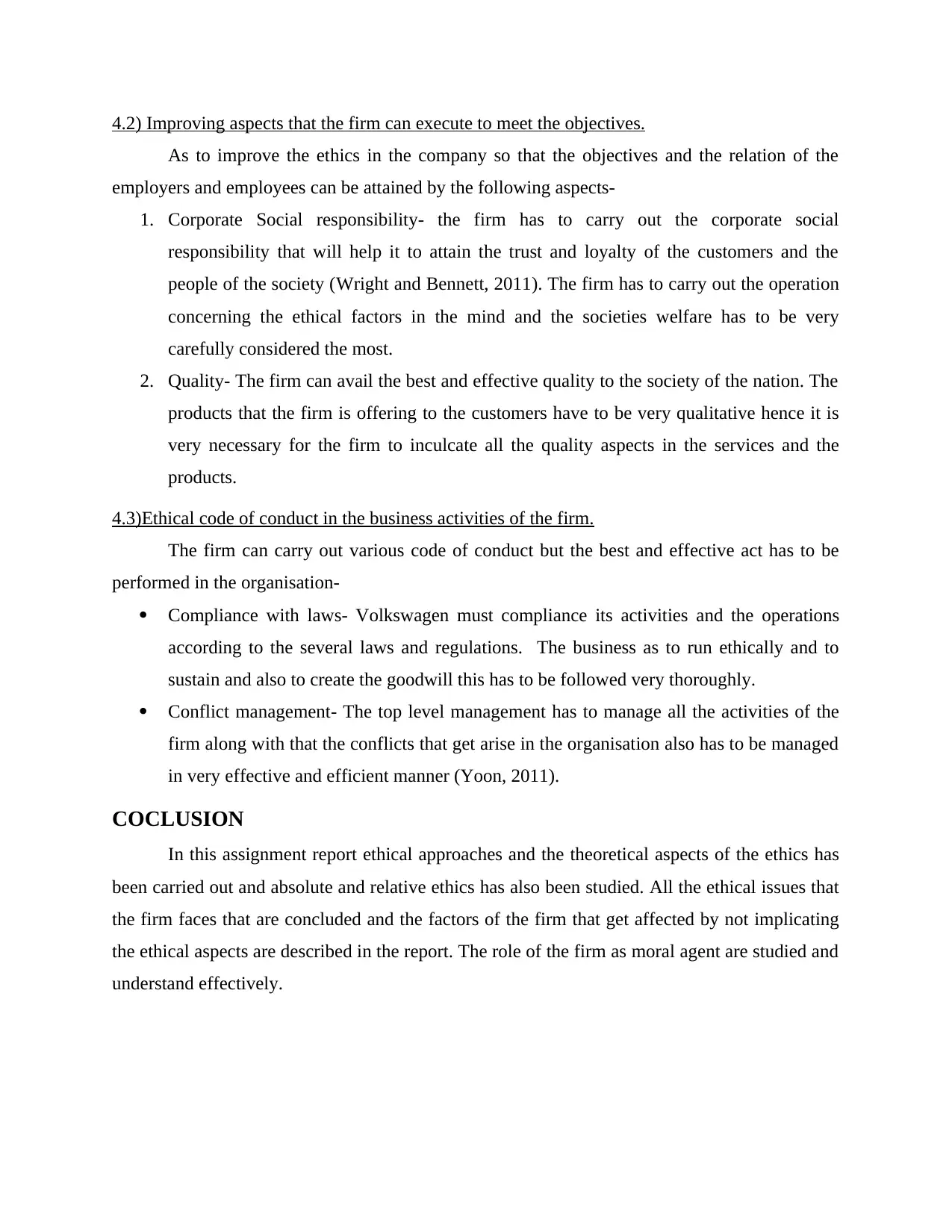
4.2) Improving aspects that the firm can execute to meet the objectives.
As to improve the ethics in the company so that the objectives and the relation of the
employers and employees can be attained by the following aspects-
1. Corporate Social responsibility- the firm has to carry out the corporate social
responsibility that will help it to attain the trust and loyalty of the customers and the
people of the society (Wright and Bennett, 2011). The firm has to carry out the operation
concerning the ethical factors in the mind and the societies welfare has to be very
carefully considered the most.
2. Quality- The firm can avail the best and effective quality to the society of the nation. The
products that the firm is offering to the customers have to be very qualitative hence it is
very necessary for the firm to inculcate all the quality aspects in the services and the
products.
4.3)Ethical code of conduct in the business activities of the firm.
The firm can carry out various code of conduct but the best and effective act has to be
performed in the organisation-
Compliance with laws- Volkswagen must compliance its activities and the operations
according to the several laws and regulations. The business as to run ethically and to
sustain and also to create the goodwill this has to be followed very thoroughly.
Conflict management- The top level management has to manage all the activities of the
firm along with that the conflicts that get arise in the organisation also has to be managed
in very effective and efficient manner (Yoon, 2011).
COCLUSION
In this assignment report ethical approaches and the theoretical aspects of the ethics has
been carried out and absolute and relative ethics has also been studied. All the ethical issues that
the firm faces that are concluded and the factors of the firm that get affected by not implicating
the ethical aspects are described in the report. The role of the firm as moral agent are studied and
understand effectively.
As to improve the ethics in the company so that the objectives and the relation of the
employers and employees can be attained by the following aspects-
1. Corporate Social responsibility- the firm has to carry out the corporate social
responsibility that will help it to attain the trust and loyalty of the customers and the
people of the society (Wright and Bennett, 2011). The firm has to carry out the operation
concerning the ethical factors in the mind and the societies welfare has to be very
carefully considered the most.
2. Quality- The firm can avail the best and effective quality to the society of the nation. The
products that the firm is offering to the customers have to be very qualitative hence it is
very necessary for the firm to inculcate all the quality aspects in the services and the
products.
4.3)Ethical code of conduct in the business activities of the firm.
The firm can carry out various code of conduct but the best and effective act has to be
performed in the organisation-
Compliance with laws- Volkswagen must compliance its activities and the operations
according to the several laws and regulations. The business as to run ethically and to
sustain and also to create the goodwill this has to be followed very thoroughly.
Conflict management- The top level management has to manage all the activities of the
firm along with that the conflicts that get arise in the organisation also has to be managed
in very effective and efficient manner (Yoon, 2011).
COCLUSION
In this assignment report ethical approaches and the theoretical aspects of the ethics has
been carried out and absolute and relative ethics has also been studied. All the ethical issues that
the firm faces that are concluded and the factors of the firm that get affected by not implicating
the ethical aspects are described in the report. The role of the firm as moral agent are studied and
understand effectively.
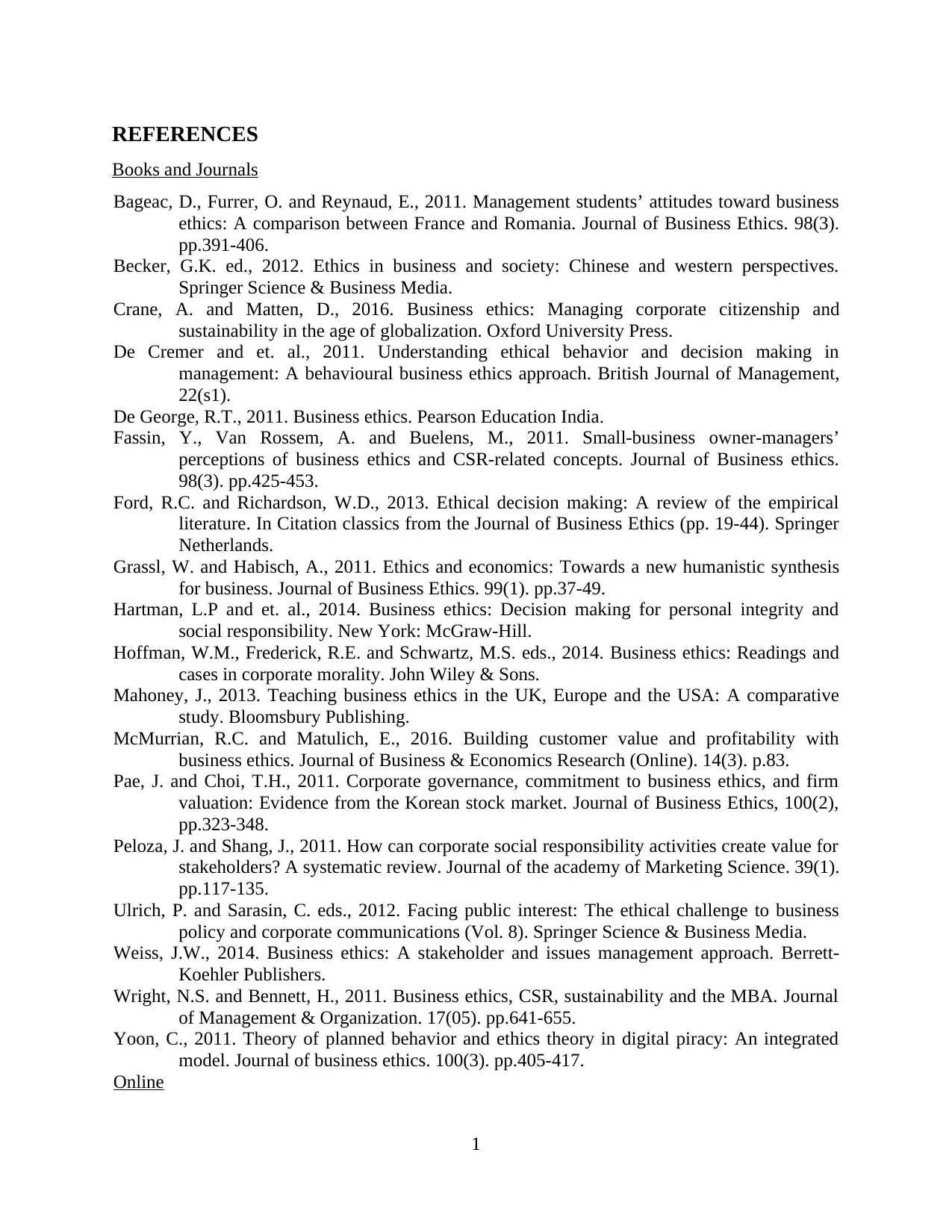
REFERENCES
Books and Journals
Bageac, D., Furrer, O. and Reynaud, E., 2011. Management students’ attitudes toward business
ethics: A comparison between France and Romania. Journal of Business Ethics. 98(3).
pp.391-406.
Becker, G.K. ed., 2012. Ethics in business and society: Chinese and western perspectives.
Springer Science & Business Media.
Crane, A. and Matten, D., 2016. Business ethics: Managing corporate citizenship and
sustainability in the age of globalization. Oxford University Press.
De Cremer and et. al., 2011. Understanding ethical behavior and decision making in
management: A behavioural business ethics approach. British Journal of Management,
22(s1).
De George, R.T., 2011. Business ethics. Pearson Education India.
Fassin, Y., Van Rossem, A. and Buelens, M., 2011. Small-business owner-managers’
perceptions of business ethics and CSR-related concepts. Journal of Business ethics.
98(3). pp.425-453.
Ford, R.C. and Richardson, W.D., 2013. Ethical decision making: A review of the empirical
literature. In Citation classics from the Journal of Business Ethics (pp. 19-44). Springer
Netherlands.
Grassl, W. and Habisch, A., 2011. Ethics and economics: Towards a new humanistic synthesis
for business. Journal of Business Ethics. 99(1). pp.37-49.
Hartman, L.P and et. al., 2014. Business ethics: Decision making for personal integrity and
social responsibility. New York: McGraw-Hill.
Hoffman, W.M., Frederick, R.E. and Schwartz, M.S. eds., 2014. Business ethics: Readings and
cases in corporate morality. John Wiley & Sons.
Mahoney, J., 2013. Teaching business ethics in the UK, Europe and the USA: A comparative
study. Bloomsbury Publishing.
McMurrian, R.C. and Matulich, E., 2016. Building customer value and profitability with
business ethics. Journal of Business & Economics Research (Online). 14(3). p.83.
Pae, J. and Choi, T.H., 2011. Corporate governance, commitment to business ethics, and firm
valuation: Evidence from the Korean stock market. Journal of Business Ethics, 100(2),
pp.323-348.
Peloza, J. and Shang, J., 2011. How can corporate social responsibility activities create value for
stakeholders? A systematic review. Journal of the academy of Marketing Science. 39(1).
pp.117-135.
Ulrich, P. and Sarasin, C. eds., 2012. Facing public interest: The ethical challenge to business
policy and corporate communications (Vol. 8). Springer Science & Business Media.
Weiss, J.W., 2014. Business ethics: A stakeholder and issues management approach. Berrett-
Koehler Publishers.
Wright, N.S. and Bennett, H., 2011. Business ethics, CSR, sustainability and the MBA. Journal
of Management & Organization. 17(05). pp.641-655.
Yoon, C., 2011. Theory of planned behavior and ethics theory in digital piracy: An integrated
model. Journal of business ethics. 100(3). pp.405-417.
Online
1
Books and Journals
Bageac, D., Furrer, O. and Reynaud, E., 2011. Management students’ attitudes toward business
ethics: A comparison between France and Romania. Journal of Business Ethics. 98(3).
pp.391-406.
Becker, G.K. ed., 2012. Ethics in business and society: Chinese and western perspectives.
Springer Science & Business Media.
Crane, A. and Matten, D., 2016. Business ethics: Managing corporate citizenship and
sustainability in the age of globalization. Oxford University Press.
De Cremer and et. al., 2011. Understanding ethical behavior and decision making in
management: A behavioural business ethics approach. British Journal of Management,
22(s1).
De George, R.T., 2011. Business ethics. Pearson Education India.
Fassin, Y., Van Rossem, A. and Buelens, M., 2011. Small-business owner-managers’
perceptions of business ethics and CSR-related concepts. Journal of Business ethics.
98(3). pp.425-453.
Ford, R.C. and Richardson, W.D., 2013. Ethical decision making: A review of the empirical
literature. In Citation classics from the Journal of Business Ethics (pp. 19-44). Springer
Netherlands.
Grassl, W. and Habisch, A., 2011. Ethics and economics: Towards a new humanistic synthesis
for business. Journal of Business Ethics. 99(1). pp.37-49.
Hartman, L.P and et. al., 2014. Business ethics: Decision making for personal integrity and
social responsibility. New York: McGraw-Hill.
Hoffman, W.M., Frederick, R.E. and Schwartz, M.S. eds., 2014. Business ethics: Readings and
cases in corporate morality. John Wiley & Sons.
Mahoney, J., 2013. Teaching business ethics in the UK, Europe and the USA: A comparative
study. Bloomsbury Publishing.
McMurrian, R.C. and Matulich, E., 2016. Building customer value and profitability with
business ethics. Journal of Business & Economics Research (Online). 14(3). p.83.
Pae, J. and Choi, T.H., 2011. Corporate governance, commitment to business ethics, and firm
valuation: Evidence from the Korean stock market. Journal of Business Ethics, 100(2),
pp.323-348.
Peloza, J. and Shang, J., 2011. How can corporate social responsibility activities create value for
stakeholders? A systematic review. Journal of the academy of Marketing Science. 39(1).
pp.117-135.
Ulrich, P. and Sarasin, C. eds., 2012. Facing public interest: The ethical challenge to business
policy and corporate communications (Vol. 8). Springer Science & Business Media.
Weiss, J.W., 2014. Business ethics: A stakeholder and issues management approach. Berrett-
Koehler Publishers.
Wright, N.S. and Bennett, H., 2011. Business ethics, CSR, sustainability and the MBA. Journal
of Management & Organization. 17(05). pp.641-655.
Yoon, C., 2011. Theory of planned behavior and ethics theory in digital piracy: An integrated
model. Journal of business ethics. 100(3). pp.405-417.
Online
1
⊘ This is a preview!⊘
Do you want full access?
Subscribe today to unlock all pages.

Trusted by 1+ million students worldwide
1 out of 13
Related Documents
Your All-in-One AI-Powered Toolkit for Academic Success.
+13062052269
info@desklib.com
Available 24*7 on WhatsApp / Email
![[object Object]](/_next/static/media/star-bottom.7253800d.svg)
Unlock your academic potential
Copyright © 2020–2026 A2Z Services. All Rights Reserved. Developed and managed by ZUCOL.





